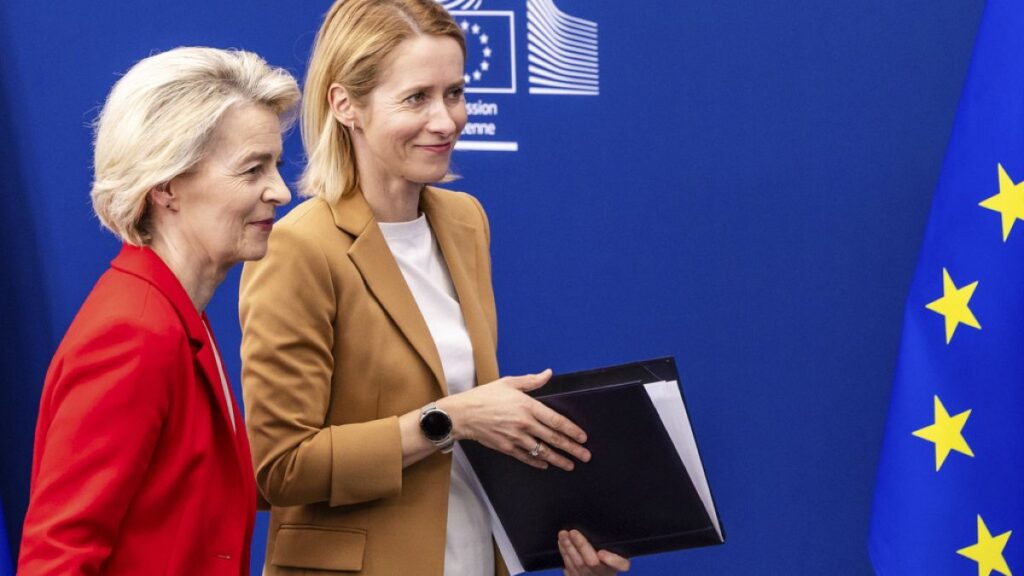European leaders responded variously with caution and concern to news of the massive US air strike on Iran’s nuclear facilities, but they all called for a return to the negotiating table, despite Iran claiming that diplomatic solutions have now been shot away.
Almost all European and EU leaders issued statements on social media X combining warnings that Iran must not develop nuclear weapons, with an entreaty that the country submits to a diplomatic negotiated settlement.
European Commission President Ursula von der Leyen joined the chorus stating that “Iran must never acquire the bomb”, but calling for a diplomatic solution.
“With tensions in the Middle East at a new peak, stability must be the priority. And respect for international law is critical. Now is the moment for Iran to engage in a credible diplomatic solution,” von der Leyen wrote, adding: “The negotiating table is the only place to end this crisis.”
“Iran must not be allowed to develop a nuclear weapon, as it would be a threat to international security,” the EU foreign policy chief Kaja Kallas chimed in. “I urge all sides to step back, return to the negotiating table and prevent further escalation,” Kallas said in a post, flagging that EU foreign ministers will discuss the situation tomorrow.
Antonio Costa – deep alarm at situation
EU Council President Antonio Costa registered deep alarm with the news arriving from the Middle East, in a post on X. “I call on all parties to show restraint and respect for international law and nuclear safety,” the Council president posted, adding: “Diplomacy remains the only way to bring peace and security to the Middle East region. Too many civilians will once again be the victims of a further escalation.”
“The EU will continue engaging with the parties and our partners to find a peaceful solution at the negotiating table,” he wrote.
German Chancellor Friedrich Merz on Sunday called a meeting of the country’s security cabinet and urged Iran “to immediately start negotiations with the US and Israel and come to a diplomatic resolution of the conflict”, according to his spokesperson, Stefan Kornelius.
UK Prime Minister Keir Starmer issued a similar response: neither fully supportive nor remotely critical of the US action.
“The strikes against Iran’s nuclear programme are of exceptional scale,” Finland’s President Alexander Stubb observed.
“For Finland, it is important that Iran does not develop a nuclear weapon and that no new nuclear weapon states emerge in the world,” Stubb wrote, adding: “The spiral of vengeance in the Middle East must come to an end. A sustainable solution requires diplomacy, dialogue and respect for the international law. We will closely monitor the situation and continue discussions with our partners and allies.”
Italian Prime Minister, Giorgia Meloni is following the crisis in Iran with the utmost attention and staged a videoconference this morning with relevant ministers and the country’s top intelligence officials, Italian news agency ANSA reported, citing Palazzo Chigi sources.
The Prime Minister will be in contact with key allies and leaders in the region in the coming hours, according to the report, which added that Italy “will continue its efforts to bring the parties to the negotiating table”.
Note of detached caution from France
France’s minister of foreign affairs Jean-Noël Barrot, adopted a slightly less supportive tone of the US airstrikes stating in a post on X that France had taken note ”with great concern” of the US strikes but ”it didn’t participate either in those strikes or in their planning.”
Barrot called for “all parties” to show restraint and avoid any ”escalation” of the conflict and insisted that a ”lasting solution” would need to be negotiated in the framework of the Nuclear Non-Proliferation Treaty.
French President Emmanuel Macron did not issue a public reaction to developments on Sunday morning.
However the chorus of demand for a return to diplomacy seems unlikely to be answered by Tehran, at least in the short term.
Iran’s foreign minister Seyed Abbas Araghchi posted on X saying that “Last week, we were in negotiations with the US when Israel decided to blow up that diplomacy.”
“This week, we held talks with the E3/EU when the US decided to blow up that diplomacy.”
Addressing Keir Starmer and Kaja Kallas directly, Araghchi asked “What conclusion would you draw?”
“To Britain and the EU High Rep, it is Iran which must “return” to the table. But how can Iran return to something it never left, let alone blew up?”
While EU foreign ministers meet in Brussels tomorrow, Araghchi will be in Moscow breaking bread with Vladimir Putin, a bad omen for those European leaders seeking a diplomatic exit from the current situation.
Read the full article here

